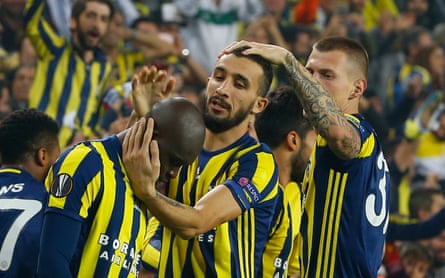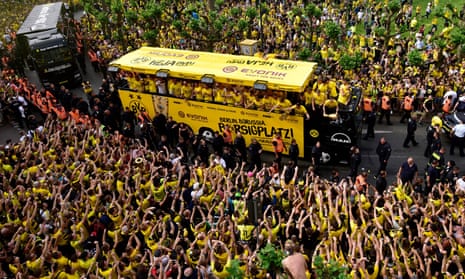Austria
Rapid Vienna, fifth in the Bundesliga
This season has been one of disappointing stagnation. Rapid finished fifth, nearly 20 points behind Sturm Graz in third and our historic city rivals Austria Vienna in second. We were 35 points behind champions Red Bull Salzburg! Rapid have recently rebuilt their old stadium in the western suburbs of the city into a state-of-the-art bijou stadium, so maybe new-stadium syndrome is to blame for a poor campaign.
Domestic football in Austria is often good. But I always worry that German clubs raid local talent. Red Bull Salzburg are very much a feeder club for Leipzig now. The lower reaches of amateur football and local leagues in Austria remain extremely well organised and financed, and fun to watch. Ben Stuttard

Belgium
Lierse SK, seventh in the First Division B
We dominated the season. We had the best attack and defence and finished five points clear at the top. I hear you all thinking: “Congratulations with the promotion.” But not in Belgium. We have this opening and closing system where the winner of the opening part of the season plays a play-off final against the winner of the closing. We ended second in both the opening and closing so we didn’t take part in the promotion final. Antwerp won that final against Roeselare. So next season it is the second division once again for us.
Our club is a perfect mix between young talent and more mature, experienced players. In Belgium most teams give young players from the own academy a chance, not only smaller teams such as Lierse but also our domestic champions Anderlecht, where the two key players Leander Dendoncker and Youri Tielemans come from their own academy. Jordi Heidbüchel
Czech Republic
Sparta Prague, third in the Czech First League
Overall it’s been a disappointing campaign. We really should have been challenging for the title. To make matters worse city rivals Slavia Praha beat Viktoria Plzen to the title! The players brought in at the beginning of the season simply haven’t been good enough. There hasn’t been enough passion. We’re the most successful club in Czech football, but have never played like champions this season. Liam Allen-Miller
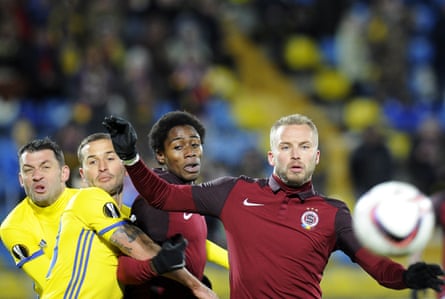
Denmark
FC Copenhagen, first in the Superliga
We won a domestic league and cup double and reached the last 16 of the Europa League. And because there was no real challenge to our Superliga title, we could really enjoy our European adventure. Midfielder Thomas Delaney was our star man until he left in January, but with the most teams in the Danish Superliga of a generally lower English Championship standard, we still had a team strong enough to win the league comfortably. Andy
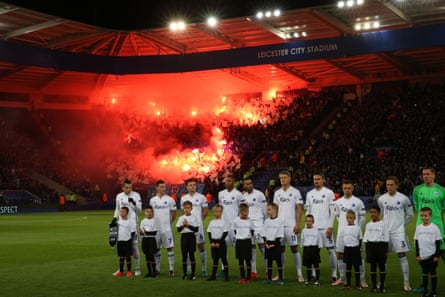
France
Paris St Germain, second in Ligue 1
This has been an average season. Two domestic cups can’t gloss over not winning the league. The team hasn’t gelled and players didn’t respond to Unai Emery’s tactics. The European exit was a freak incident. The first leg against Barcelona showed we can beat any team on the day. The second leg left the whole club shellshocked for the rest of the season. Nico
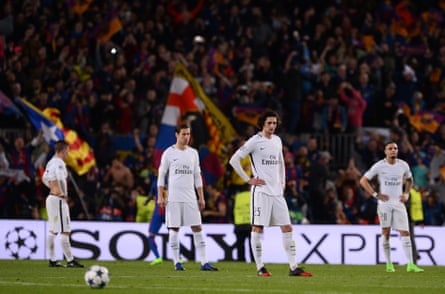
Lyon, fourth in Ligue 1
Given the money spent compared to previous seasons, this has bee a decent season but I expected more. Not even challenging for the Champions League spots was disappointing. I have been critical of manager Bruno Genesio due to his inexperience, but he did OK to take us to the Europa League semi-finals. Losing 13 games in Ligue 1 was unacceptable though. I still don’t think Genesio is the right guy to take this team forward next season. I’m hoping for someone like Laurent Blanc or Claudio Ranieri but I’m not sure we can afford them. Alternatively, Rémi Garde coming back would be nice too.
It was another good season for players who came out of our academy like Alexandre Lacazette, Nabil Fekir and Corentin Tolisso. I expect Fekir to stay but Laca to leave for Atlético Madrid and Tolisso to go to Juventus. The emergence of young central defenders like Emmanuel Mammana and Mouctar Diakhaby, as cover for N’Koulou and Yanga-Mbiwa was encouraging as well. Raylan Crowder

Marseille, fifth in Ligue 1
While a fifth-place finish for one of the biggest clubs in France probably doesn’t seem much to shout about, it’s an improvement on the previous campaign, when we finished a miserable 13th. Marseille have been a selling club for the past two seasons. With that in mind, fifth place and a return to Europe is not terribly disappointing.
Former Los Angeles Dodgers owner Frank McCourt bought the club and in came the immensely competent but freshly fired Rudi García, along with players such as Patrice Evra, Morgan Sanson, and some guy named Dimitri Payet. Other bright spots included the emergence of homegrown Maxime Lopez, as well as performances from Newcastle exile Florian Thauvin.
Ligue 1 was the second most represented league in the semi-finals of the two European club competitions. The world’s most expensive player is French and the next one is likely to be French as well. The Premier League player of the Season is French. So there’s a lot to be proud about in French football. Pascal Chan

Rennes, ninth in Ligue 1
This was a season of two halves. The club are perennial underachievers and so, while it was great to see them flirting with fourth place for a while, deep down we knew the doom and gloom would return. The winter break came and out went attacking talent such as Kamil Grosicki and Paul-Georges Ntep. They were replaced by older, slower and decidedly more injury prone players such as Morgan Amalfitano.
It sadly came as no great shock that post Christmas, Rennes recorded only three league wins and ultimately finished ninth. We then had to see one of our few real quality players in goalkeeper Benoit Costil leave on a free transfer after six years with the club. One shining light was the emergence of gifted young centre-back Joris Gnagnon. A real standout season from him and he’s already being closely watched by a host of clubs from England, Italy and Germany. Rich Allen

Toulouse, 13th in Ligue 1
Surfing the crest of last season’s miraculous survival, Toulouse started the season with a swagger that led to high-profile wins over Paris Saint-Germain and eventual champions Monaco. Another season flirting with relegation seemed out of the question and talk of European football was abuzz in the heart of French rugby country. The talented team is young and raw. When confidence was up the players were fearless and swashbuckling. When confidence was down – as it was at the turn of the year – the lack of experience and nous became a hindrance. The club could only muster three league wins in 2017. Even coach Pascal Dupraz, the notoriously energetic motivator, struggled to shake any life into the team.
Despite the poor form and results in 2017, Toulouse did enough to stay up, relatively comfortably, thanks to plenty of draws. Our 18-year-old goalkeeper Alban Lafont has been the success story of the season. He is so calm, dominant and prodigiously talented for his age. His spectacular performances have saved many a point for Toulouse this season. Miles Watson

Germany
Bayern Munich, first in the Bundesliga
Bayern achieved “the minimum” of winning the Bundesliga. The semi-final loss to Dortmund in the German Cup was unlucky. But the Champions League quarter-final defeat to Real Madrid was particularly hard to swallow, given the refereeing errors at the Bernabéu in the second leg. Can anyone really blame Carlo Ancelotti and the players for that? Yes, he should have subbed Arturo Vidal sooner but he’s not to blame for two offside goals and Casemiro being allowed to stay on the pitch.
The quality of the team and the squad as a whole are phenomenal. In Europe, only Real Madrid have as deep a squad as Bayern. For this reason, Ancelotti’s decision to retain a fixed starting XI with barely any rotation is even less acceptable than it would be at another top club, especially in regards to the many high-quality young players. Renato Sanches, Joshua Kimmich and Kingsley Coman were probably the three best young players at Euro 2016 in France but they barely had a run this season. That has to change drastically next year. Tariq
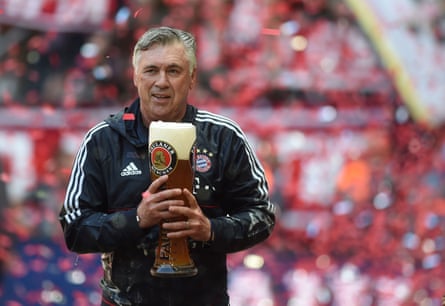
Borussia Dortmund, third in the Bundesliga
We did well. Finishing third in the league, and beating Eintracht Frankfurt in the German Cup final can only be classed as a successful season. I don’t think we are in a position to win the league at the moment though. Bayern are just too strong. But I like our young team with talent like Ousmane Dembélé and Christian Pulisic, and hope most of them will stay. Marco Reus needs to recover from his latest injury setback. He’s such a fantastic player. I also wish Thomas Tuchel hadn’t been dismissed. It will be interesting to see who will coach us next season. FC
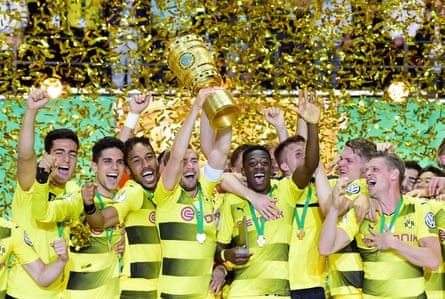
FC Köln, fifth in the Bundesliga
My club did unbelievably well and the whole city is ecstatic. Finishing fifth and qualifying for Europe is an absolute dream season for us. I honestly didn’t expect this to happen in my lifetime. For a few years now it has felt like the club is being run by grown men who do things professionally. That was not the case before. There’s a calmness around the club that we haven’t seen for some time and the debt has somehow been taken care of. It all seems too good to be true really. Anna

Hertha Berlin, sixth in the Bundesliga
We were good in the first half of the season, but dire in the second half. Good at home, but terrible away from the Olympiastadion. Despite a sharp decline after the winter break, we scraped into the Europa League group stage with a sixth-place finish. And a negative goal difference.
Pál Dardai has managed to get the best out of a solid but unspectacular squad. The football isn’t always easy on the eye but the league position speaks for itself. On the pitch, our defence is the most impressive. John Anthony Brooks may move to England for big money, Marvin Plattenhardt might be Germany’s new left-back, and Mitchell Weiser is the chief playmaker from right-back. Up front, the ageing duo of Salomon Kalou and Vedad Ibisevic do just enough to keep opponents busy. Rüdiger Liebesherr
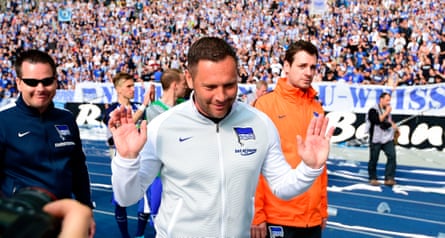
Werder Bremen, 8th in Bundesliga
We should be happy with finishing eighth. After the winter break, Werder Bremen looked like their old selves; they scored loads of goals and entertained. But for the first 17 games we looked out of our depth against everyone. Alexander Nouri’s tactical shift to three at the back did the trick thankfully, and Max Kruse continues to impress. I hope Werder Bremen can put together a full season in 2017-18. If they can, European football won’t be far away. Keylor

Borussia Mönchengladbach, ninth in the Bundesliga
We had an awful start to the domestic season, after qualifying well for the Champions League against Swiss outfit Young Boys. Nobody really started to worry because last season we lost the first five games of the season and still ended up fourth. But this time we lost silly games, including a forgettable double against Hamburg SV. Losing Granit Xhaka to Arsenal and experienced players like Roel Brouwers and Martin Stranzl bowing out of football altogether, coupled with an absolute nightmare of an injury list, hit us hard early on. And even though there were some great games, like coming back from 0-2 down to win 3-2 in the first game against Bayer Leverkusen, we didn’t really recover well from the bad start this season.
The second half of the season started well and then the inconsistency set in again. In the end we finished ninth which was OK for a club who had set a “single figure” finish as the season’s target. But we’ve already lost two key players in Mo Dahoud (Dortmund) and Andreas Christensen (Chelsea) so next season already looks much harder. ErbsenZaehler

Bayer Leverkusen, 12th in Bundesliga
Our season went badly off script! We only just avoided the relegation play-off in the last game of the season. That’s a shock for a Champions League club. Under Roger Schmidt we had developed an intense pressing game that worked well in the previous season. Tayfun Korkut has made us significantly worse. I hoped we would challenge for the title, with strong financial backing, but it wasn’t to be. Losing Hakan Calhanoglu for the season for a transfer indiscretion that didn’t involve our club seemed harsh, and we couldn’t adequately replace him. Robbie Kruse moving to China also disappointed me. Michael Hargreaves
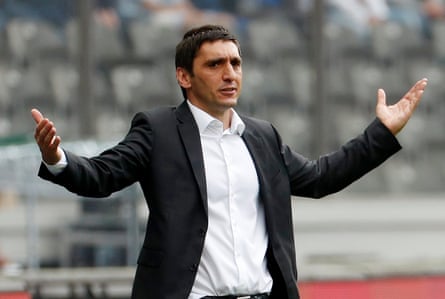
Hamburger SV, 14th in Bundesliga
Again we barely avoided relegation this season, with a late winner against Wolfsburg in our last match. The feeling after the game was mesmerising. It felt more like we won the league as the fans went on to the pitch to celebrate the players for saving this, once so glorious club, at the last minute. Looking back at this season I have mixed feelings. On the one hand it was hard work and a great comeback by the team that were basically relegated, having only collected two points from the first 10 matches. Bruno Labbadia had to go unfortunately.
A decent second half to the season meant we were able to do the impossible. But we’re still not getting the best out of quality players like Lewis Holtby and Filip Kostic. Hopefully we are able to play a less nerve-wracking campaign next season. The great fans of this great city deserve better. Paul Schossig
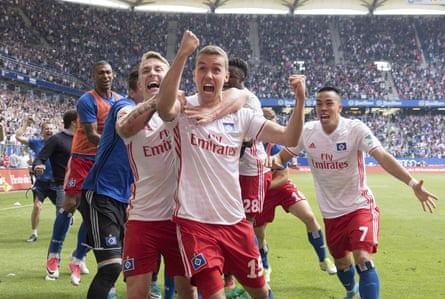
VfB Stuttgart, first in the 2. Bundesliga
For the first time since 2012 I actually enjoyed following my team! After being relegated from the 1st Bundesliga last season, this year could have either been the beginning of the end for the club (see the fate of former Bundesliga regulars Kaiserslautern) or offer the chance to come back stronger. Against my expectations the latter happened. After a bumpy start and the unexpected resignation of our manager Jos Luhukay, Stuttgart finally seems to have turned a page.
The appointment of Jan Schindelmeiser as new director of football meant we had someone pulling the strings at the top who actually knew what he was doing. The new leadership brought the club much needed stability after years of chaos and short-term thinking. Mathias Seiter
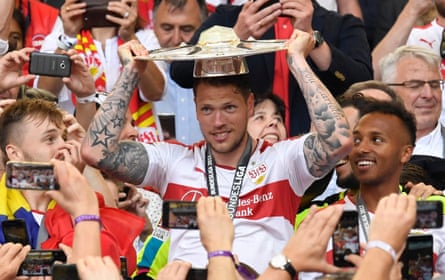
Hannover 96, second in 2. Bundesliga
Promotion was exactly what was needed at the start of the season following our relegation from the Bundesliga. And beating our biggest rivals Eintracht Braunschweig for the first time since 1998 was also a highlight this season.
Former player Daniel Stendel took over at the end of last season, and he instantly improved the atmosphere around the club and gave us a good start. Sadly he didn’t last and he was replaced by another former player in Andre Breitenreiter in March. We then went unbeaten in the last 10 games of the season, keeping clean sheets in eight of them. That run, plus a great record at home and against the top teams around us in the table, took us up. Allan Howe
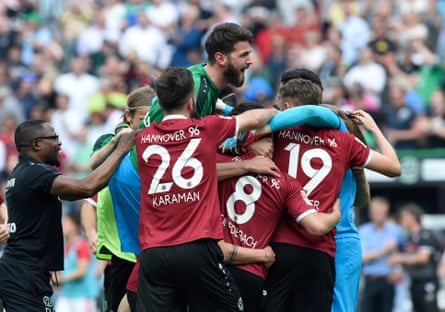
Union Berlin fourth in 2. Bundesliga
Berlin finished in an impressive fourth, six points off of the promotion play-off spot. Despite our ultimate failure to achieve promotion, the season was an undoubted success for a small East German team such as ourselves. Lack of experience and depth ultimately cost us with two late defeats to promotion rivals Hannover, and a shock defeat to struggling Aue dented our confidence.
The quality of the 2. Bundesliga is very good but, like most second tier leagues, the games are often dependant on crosses and individual quality rather than the overall skill of the team. The addition of Bundesliga heavyweights Hannover and Stuttgart improved the quality this season. Jibril
FC St. Pauli, seventh in 2. Bundesliga
The first 15 games this season were the worst I’ve ever seen. We only won one game and even worse we played without any passion. At the game in Sandhaven even our ultras decided after 60 minutes to stop the support. Then we beat Greuther Fürth away and suddenly something chanced. After only collecting 11 points in the first half of this season and being the bottom of the table, the team surprised everyone. In the second half we won five games in a row and collected 34 points. It was the best second half of any season in St Pauli’s history. The signing of Norwegian midfielder Mats Moller Daehli in January was a turning point. He was the player we were missing in the first half of the season. Luna
Greece
PAOK Thessaloniki, second in the Superleague
We did pretty well, finishing six points behind champions Olympiakos. We were also carrying a three-point penalty for crowd trouble from the previous season. We won the Greek cup for the first time in14 years and qualified for the round-of-32 in the Europa League, with a memorable win in Florence against Fiorentina the highlight. The football was often entertaining, but I wish we could have been a bit more consistent.
Domestic football in Greece is actually not as bad as many people think. The problem lies in corruption and also in the mentality. Fans tend to take football very seriously and personally, so managers are under immense pressure to win at all costs and we get a lot of low-scoring matches. Hopefully now the corruption is being dealt with slowly, our football will improve. You can’t beat the atmosphere in big matches. Konstantinos
Hungary
Pécsi MFC, second in NB III
My club will most probably finish second in the Hungarian third division. Being runner-up could be considered a good result, but only the champion gets promotion to the second division. As my club used to compete in the first division only two years ago, and were only demoted because of financial problems, not gaining promotion this year is most definitely a failure. The club still has a relatively strong squad and a massive supporter base, so everyone thought we would bounce back quickly. But the sad story of our club continues. Miklós
Italy
Juventus, first in Serie A
This season was one of the greatest in the club’s history, but it remains to be seen whether it will be the very best if we complete our first ever treble on Saturday. We have won our sixth consecutive Scudetto, while also completing our third straight domestic double. These feats have both been unmatched by any other Italian club in history. However, it was not a smooth ride by any stretch of the imagination. This season’s title race has been one of the closest of all the six title-winning campaigns. Roma and Napoli have both recorded club-record Serie A point totals this season, constantly pushing us to the limit as the rest of the league has gradually begun to close the gap.
The arrival of Gonzalo Higuaín from Napoli in the summer allowed us to further bolster our offensive prowess alongside Paulo Dybala and Mario Mandzukic. Coupled with the further arrivals of Miralem Pjanic, Dani Alves, Mehdi Benatia and Marko Pjaca, we appeared to further improve our overall squad depth, which allowed us to make an even stronger push for a third Champions League title. The 3-5-2 had become a staple at Juventus since Antonio Conte’s arrival in 2011, however after over five successful seasons employing this formation, it had become stale and our opponents were able to figure out how to counter it. Tactical mastermind Max Allegri, debuted the 4-2-3-1 formation against Lazio in January, which allowed Juventus to achieve the best balance between attack and defence and allowed us to play all of our star players. The formation gave us the best chance to win with enthusiasm. Allegri’s change in formation is the main reason for Juventus’ success in the 2016-17 season. Daniel Mognon
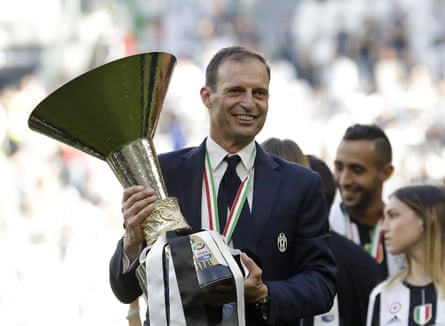
Roma, second in Serie A
We started off really badly, with Rudi García leaving us way behind Juve early in the season. Unfortunately, we stuck with him for too long before bringing in Luciano Spalletti. He led us to second and a Champions League place. If we had brought him in earlier, we could have won the Serie A title. With both Spalletti and club legend Francesco Totti having left the club, it might be a while before we see such a successful season. Seung Gi Kim

Lazio, fifth in Serie A
We had a phenomenal season led by the perennially loyal and underrated Simone Inzaghi. Not only did we finish fifth, but more importantly we knocked Roma out of of the Coppa Italia and destroyed Totti’s Roma in his last Derby Della Capitale. With a relatively young squad, there is lots to build on for the future.
Inzaghi’s obviously has fantastic man-management skills, especially regarding Keita Baldé. His penchant for beautiful, attacking football must also be applauded. Napoli may get the pundits’ adoration but Lazio are just as exciting to watch. With our stars Ciro Immobile, Balde Keita, Felipe Anderson, and Sergej Milinkovic-Savic blossoming into a cohesive unit, Inzaghi has had a lot to work with this season to reach this success. Reaching the Coppa Italia final was a success, and I can only hope that our owner, Claudio Lotitio, is willing to spend money next year to compete. Marco
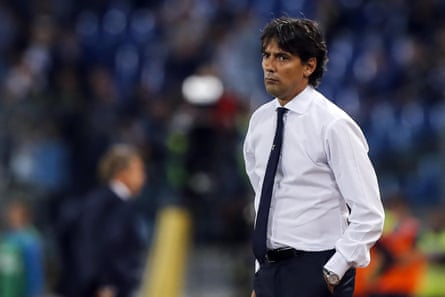
Milan, sixth in Serie A
I’m fairly satisfied. Maybe it’s do with the low expectations given the clear deficiencies in our playing squad and the fact that we hadn’t qualified for Europe in the last three seasons. The delays in the takeover were immensely frustrating but apart from a bad spell of results towards the end of the season, Vincenzo Montella managed to keep a sense of calm and serenity in the squad. We had some good momentum around the middle of the season, when it felt we could push for fourth, and it was not fun to then drop points against teams we should have been swatting away. But ultimately Montella didn’t have a great bench to call upon whenever there were injuries or suspensions and that ended up being restrictive.
We finally have a good manager and a strong core of young Italian players such as Gigio, Manuel Locatelli and Alessio Romagnoli who clearly care about the club. Suso was a delight to watch too this season and Gerard Deulofeu as well, in spurts. Also, a shout out to Chelsea loanee Mario Pasalic, who did a good young Frank Lampard impression with his timely goals from midfield. What kept us from doing better was a devastating injury to our creative metronome in midfield Giacomo Bonaventura at a critical stage of the season. We just didn’t have a replacement for his flair and vision in the middle of the park. Rahat Jain

Inter, seventh in Serie A
We have done worse than anybody could possibly have imagined. It was clear what kind of season this was going to be from the moment Roberto Mancini conducted his first press conference in pre-season, but even so it’s been an implausibly disastrous year. All three season objectives ended in failure and failure by a very long way. The club said they wanted to qualify for the Champions League and didn’t even make the Europa League. The club said they were aiming to win the Europa League and finished bottom of their group. The club said they wanted to win the Coppa Italia and they were beaten at home in the quarter-finals. There is a very strong argument to suggest that this has been the most indecorous, humiliating and embarrassing season in Inter’s entire history.
The decision to replace Mancini with Frank de Boer a week before the season started was abysmal. But the overall issue that connects all the mistakes made by the club this season is this: Inter is a club where everybody cares about themselves and nobody cares about Inter. The result is that everybody is pulling in different directions and there is no team spirit. The entire club needs repairing from top to bottom. Will Beckman
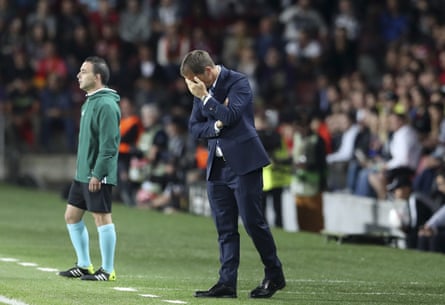
Torino, ninth in Serie A
If Joe Hart had kept one clean sheet in the last 18 games, a European place would have been possible. Without Andrea Belotti, relegation would have been likely. This season is definitely a glass-half-full scenario. Steve
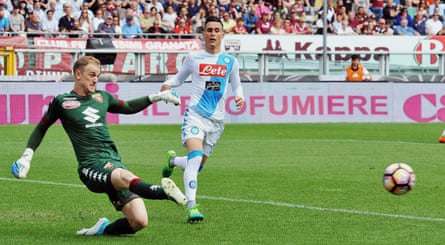
Sassuolo, 12th in Serie A
We hugely overachieved last season, reaching sixth in Serie A, but weren’t able to recreate that league form, as well as juggle our maiden European campaign. A late surge took us to a solid 11th-place finish. Few supporters would have expected a second tilt at Europe, and mid-table suits us nicely, especially with the relative improvement of teams around us.
Most keys players have been out for a period of time this season with injuries, most notably Domenico Berardi who started the season brilliantly before a knee injury sidelined him for four months. We haven’t had a settled team for most of the season and have struggled for fluidity at times. Losing three points due to playing an unregistered player against Pescara didn’t helped either. Mat

Bologna FC, 15th in Serie A
This was our second season in Serie A after promotion in 2015. Last year we finished in 14th with 42 points, so progression has been minimal, but we have never been in danger of going down. Roberto Donadoni has done incredibly well after he took over as coach in the autumn of 2015. Last summer we sold Amadou Diawara for quite a lot of money and reinvested the proceeds in several new players. This made the team a lot better than last season and, although we ended up with less points, this season should be seen as a success.
The second season after promotion is never easy, but our Serie A status was never in danger. Blerim Dzemaili in midfield has provided several goals and has been very important this season. Additionally, Antonio Mirante in goal is a very good goalie for a team of our status. Fredrik
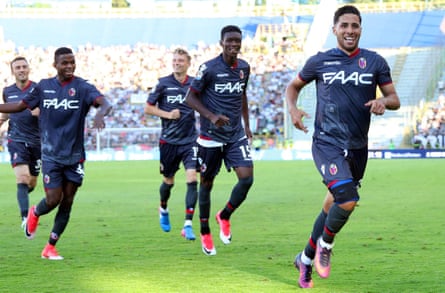
SPAL, first in Serie B
Having finally ascended to Serie B, we have surprised everyone by securing a return to Serie A after 49 years away, winning the division ahead of Verona and Frosinone. Workmanlike and at times fortunate, our success caused great joy in Ferrara. In some respects the failings of the other more fancied teams such as Verona, Frosinone, and Carpi paved the way for our success.
Mirco Antenucci arrived from Leeds and proved his worth with some crucial goals. Sergio Floccari joined halfway through the season from Bologna and scored seven goals in 13 matches. Midfielder Luca Mora also showed plenty of finesse when needed. Manager Leonardo Semplici deserves credit for moulding and remaining loyal to his squad throughout the season. What lies ahead remains to be seen with the club forced to issue several social media requests for fans to stop ringing about season tickets! Dan

Parma, second in Lega Pro, Girone B
After getting promoted from the semi-pro ignominy of Serie D at the first attempt, we had a reasonable start in the third tier. The form was excellent until March and we were competing for automatic promotion with a Filippo Inzaghi-inspired Venezia. But automatic promotion hopes fell away after losing a number of key matches.
Success has been measured by the consistency of club legend and bastion of all things good about the club Alessandro Lucarelli and the key goals scored by Yves Baraye. Lack of firepower up front combined with injuries to key players such as Emanuele Calaio and Baraye towards the business end of the season cost us. Edgar
Netherlands
Feyenoord, first in the Eredivisie
We’ve just won our first league title in 18 years. I won’t say it was worth the wait, but it was pretty amazing. We were top of the league the entire season and finished it of in style; at home with a hat-trick scored by our captain, leader and legend Dirk Kuyt.
Head coach Giovanni van Bronckhorst always believed in the squad. We have eager young players who are learning among calmer, more experienced players such as Kuyt, Karim El Ahmadi and Brad Jones in goal. And Nicolai Jorgensen hasn’t stopped scoring. Everyone played to win this year and that showed! Semma

FC Utrecht, fourth in the Eredivisie
We finished fourth and it’s only the third top-four placement in the Utrecht’s history. In the Netherlands, the teams placed between fourth and ninth play in a system of play-offs to determine the winner of the fifth and final Dutch European ticket. And Utrecht miraculously won the play-offs, seeing off AZ Alkmaar after two crazy games. After losing 3-0 in Alkmaar, the return leg was believed to be irrelevant. But in the Galgenwaard, we managed to turn the tide, won 3-0 and finished the job with a penalty shootout. We now have a chance to qualify for the Europa League group stage! Ian Enserink
VVV-Venlo, first in Eerste Divisie
We are going up! Winning the Eerste Divisie and a return to the Eredivisie back among the giants of Dutch football is a fantastic achievement for a club regarded as minnows in Dutch football. After some near misses in the last couple of seasons, we have managed to build a swashbuckling team capable of scoring goals for fun. The 7-0 walloping of Helmond Sport was particularly entertaining. Alexander Gowing
Northern Ireland
Coleraine, third in the Premiership
Astute management of young, talented and local players mean we finished third in the Irish Premiership and qualified for the Europa League. I wish the national media would pay more attention to our league though! It produces good, young players who end up in either England or Scotland. More coverage would raise the profile of the league, players and management. Considering Michael O’Neill (Coleraine), Brendan Rodgers (Ballymena) and Gareth McCauley (Coleraine) all started their careers in the league, the neglect by the national media remains unwarranted. George Peel
Portugal
Benfica, first in the Primeira Liga
On a domestic basis, the season has been fantastic. We retained our league title for the fourth year running and completed the domestic double by beating Vitória de Guimarães in the Portuguese Cup final. Rui Vitória is a manager who understands how to get the best out of our team. The football may have not been as eye-catching as last season, but this time around we played like a team that is used to winning and expected to win no matter how dirty or scrappy it may have been. Losing Nicolás Gaitan and Renato Sanches impacted the flow of our game, and this showed in our Champions League campaign. We were missing the creativity and energy both players would have provided. Miguel De Castro

Russia
FC Zenit Saint Petersburg, third in the Premier League
Everything seemed brilliant when the campaign started back in July. Under the new Romanian manager, Mircea Lucescu, we beat CSKA Moscow in the Russian Super Cup. Fans saw some miraculous autumn victories in the Premier League, cup and Europa League. We played quality football. Then everything fell to pieces before Christmas. Zenit were beaten in Krasnodar and drew 0-0 draw away at Rostov. Spring saw no improvement at all. The club’s powerful sponsor Gazprom will not be happy with third place in the league.
The atmosphere hasn’t always been the best inside the stadium. Many fans do not accept players who came from the Moscow clubs (Dzyuba, Kokorin, Zhirkov, Yusupov) and therefore there’s no strong connection now between the supporters and the team. Lucescu was always complaining about everything around him instead of admitting that we were worse than our rivals. He had clear favourites which he picked despite their poor form, ignoring the products of the our fine academy. Vladislav Riabov
Scotland
Celtic, first in the Scottish Premiership
Undefeated domestically while playing entertaining football most of the way. There’s nothing to complain about there. Our European campaign started with an almighty hiccup in the qualifiers against Gibraltan outfit Lincoln Red Imps, and a 7-0 Nou Camp demolition job in the first group game, but after that we were competitive in every game. Yes, the quality of the Scottish Premiership isn’t great, but you can only play the teams put in front of you. The future is bright! Brendan
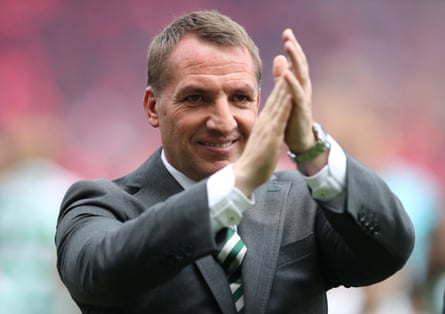
Aberdeen, second in the Scottish Premiership
We are the ultimate runners-up, finishing second best in the Premier League and both the domestic cups. We were outstanding in the cup final though, which provides great hope for next season. In Europe the club again reached the third qualifying round of the Europa League, where they fell to Maribor. Once again we lost to a smarter more tactically astute team able to take its chances.
The players gained a record in terms of points in the league (76) and that came thanks to a wide spread of goalscorers. At the moment Aberdeen are a financially stable club with a close-knit squad and no debt off the field. The players’ wage bill is sensible meaning the club is happily working within its means. This has created a good squad bond with players on similar wage levels who all respect each other and get on. Damon

Partick Thistle, sixth in the Scottish Premiership
Given the financial restraints on a club with an average of around 3,500 home gates, we achieved our highest league placing in decades while playing an attractive, passing style of football instead of the 100mph, pinball style more common in the Scottish Premiership.
From the top down, the club have been gelling well for the past five seasons, and with the recently established youth program we may see Thistle finishing in the top six for years to come, while maintaining their style of play. Ross
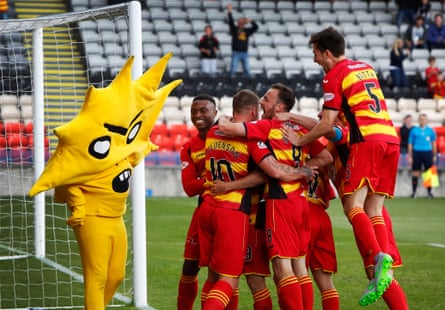
Spain
Real Madrid, first in La Liga
I am overjoyed by my club’s performance this season. The players have a never-say-die attitude and huge praise goes to Zizou, Sergio Ramos and pretty much everyone at the club for bringing back that aggressive, controlled tempo of football. Pruthvi
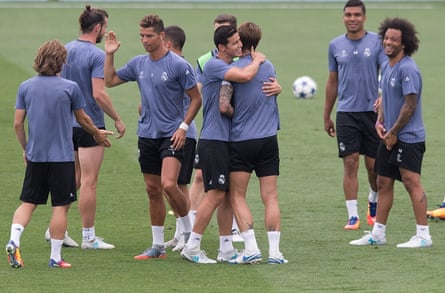
Barcelona, second in La Liga
In terms of Barcelona’s high standards, this season has to go down as a failure. Our inability to beat teams lower in the table ultimately cost us the league and the over-reliance on our front three, especially Lionel Messi, has meant that we don’t control the game in midfield and suffer when the forwards are not playing well.
There have been unforgettable moments this season such as the 6-1 victory over Paris Saint-Germain in the Champions League, and beating Real at the Bernabéu with Messi scoring his 500th goal for Barcelona in the dying seconds of the game. It’s been a disappointing season with flickers of enjoyment and entertainment that cover up the noticeable cracks appearing in an uneven squad. Mourad Kourbaj

Atlético Madrid, third in La Liga
We started the season with a blip, dropping points against Leganes and Alavés, and then built up steam obliterating Celta Vigo, Sporting Gijón, Valencia and Granada to name a few, while also beating Bayern in the Champions League. Sevilla beat us and knocked us out of our stride, leading to more defeats against Real Sociedad and Real Madrid and it looked as if Diego Simeone had finally lost his magic. But at least we finished off the season by claiming the automatic Champions League spot and giving our stadium a strong goodbye.
Most of our success is still in defence. Diego Godín is still a world class defender, Filipe Luís is one of our main attacking outlets and Stefan Savic was solid. José Jimenez and Lucas Hernandez will be mainstays when they’re ready to take over. Up front, Antoine Griezmann was his usual effervescent self, sparking most of what we did. Will we be able to keep him? Jason
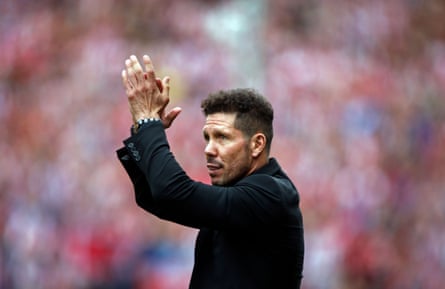
Sevilla, fourth in La Liga
What would be regarded as a highly successful season for most clubs in La Liga – fourth in the league and a Champions League campaign that took them to the last-16 – ultimately proved to be disappointing for the majority of Sevilla’s fans. Reaching 72 points in La Liga for only the second time in the club’s history should be seen as a landmark, but there is an air of resigned disappointment and latent frustration around the club. It could and should have been a season of more.
The arrival of the Argentinian coach Jorge Sampaoli and his brand of football labelled “amateurismo” led to a rollercoaster ride of a season that started with a crazy 6-4 win over Españyol, where both teams defences failed to show up, and ended with the customary defeat at the Santiago Bernabéu.
Sampaoli should take the plaudits as well as a large share of the blame. He ran out of ideas in February and also had his head turned by the Argentina job. One of our players, Vicente Iborra, has said it all started to go wrong once the press made the team candidates for winning La Liga, but the dramatic loss of form of key players such as Steven N’Zonzi, (just after signing a new contract), ‘Mudo’ Vázquez and Samir Nasri left a large hole in the middle of the team. Although all the fans want Stevan Jovetic to stay, it looks unlikely that the club can afford to pay his wages. Leporello
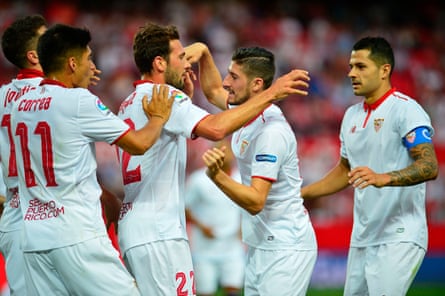
Athletic Bilbao, seventh in La Liga
We finished seventh, but still qualified for the Europa League as Barcelona beat Alavés in the Copa del Rey final. The big disappointment was this season’s Europa Leauge fiasco, getting knocked out by Apoel Nicosia. We have a very tight-knit group of players and, despite losing stars such as Fernando Llorente and Ander Herrera in recent years, the team still performs at a very high level. Iñaki Williams, Raúl García, Aymeric Laporte and Aritz Aduriz are among the best players in La Liga. Our coach, Ernesto Valverde, has also been key to the team’s success but they will now have to continue their record of never having been relegated without him. Kenny McDonnell
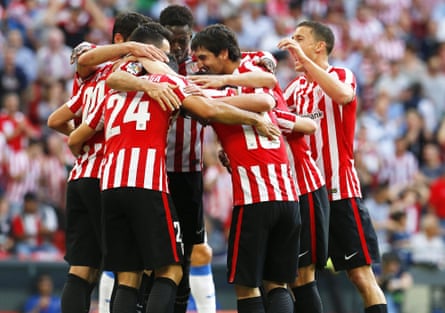
Espanyol, eighth in La Liga
We had a brilliant campaign in Quique Sánchez Flores’ first year at the club, finishing eighth and never looking like we would be in any relegation trouble. For much of the second half of the season, the notion of qualifying for the Europa League was floated but we narrowly missed out. With more investment anticipated in the summer, the aim will be to climb into the European spots next year. Geoff
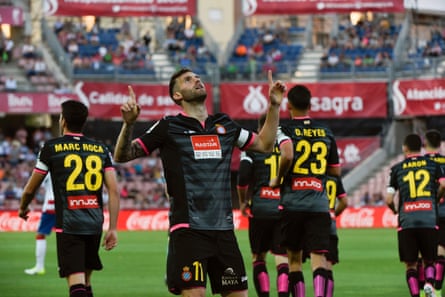
SD Eibar, 10th in La Liga
This year was the best in Eibar’s history, with the team finishing 10th in just their third ever top-flight campaign. This is a club from a town of 27,000 people and one described as a third division side by their previous president, so for them to even be in La Liga was already an overachievement. To finish 10th and to pick up a point away at Real Madrid was incredible.
The club has enjoyed success under two different coaches now and the work of current boss José Luis Mendilibar was perfect, but the one man who has been through all the recent glory is sporting director Fran Garagarza who keeps finding quality players on a shoestring budget. Euan

Deportivo de La Coruña, 16th in La Liga
It was acceptable. Surviving in La Liga is a modest aim for a club our size, but with so little money available we can’t really expect much better. Alfonso Beijon
Elche CF, 21st in Segunda División
I had a season ticket for 2016-17 but became so unenamoured with the team’s playing style that I missed most of the games. They try to play from the back Barça-style but end up putting their goalkeeper under pressure and losing the ball cheaply. Although there were management changes, the player pool is still affected by the club’s lack of funds. An excellent out of town stadium and associated training facilities can’t make up for the lack of money to attract real quality players. Douglas
Santutxu FC, 16th in Tercera Division Group 4
Santutxu have flirted wildly with relegation this season, but finished in a lofty 16th place having spent most of the year in the bottom three. Normally the bottom three are automatically relegated but, as two Basque teams came down from the third tier (Segunda B), two other teams have to make way as well. Some terrible refereeing decisions have had a huge impact on our season, particularly the away game against Lagun Onak. And Lagun Onak finished three points above Santutxu and are safe. But the main reason for our struggles has been late goals and draws. Santutxu drew 17 matches out of 38 this season. Thomas
Turkey
Besiktas, first in Super Lig
Besiktas have won back-to-back Turkish titles for the first time since 1992. The impressive 4-0 away win against Gaziantepsor sealed the deal. Manager Senol Gunes has brought stability and a winning mentality since becoming manager in 2015. His side play attractive, attacking football and he has managed to bring the best out of each player. He doesn’t get the credit he deserves but he is the greatest manager in Turkish football history. Many forget that he guided Turkey to third place at the 2002 World Cup.Another great thing about this team is how balanced it is. The starting XI is strong in all areas of the pitch and they play well as a group. Jens Raitanen

Fenerbahce, third in Super Lig
This season was way below expectations. Our manager Vítor Pereira was sacked after the Champions League qualifier disaster and Dick Advocaat could only be appointed to manage a squad he had no input in apart from the deadline signing of Jeremain Lens. Although we topped our group in the Europa League, the friction between the board and Advocaat grew and the fact that no signings were made led to our collapse in January. After agreeing to coach Holland again, Advocaat has seemed very disinterested. Our chairman Aziz Yıldırım is obsessed with the club and it has hurt us for the past decade. His irresponsible signings and firings have resulted in almost empty stands. He has to go. Onder Susam
